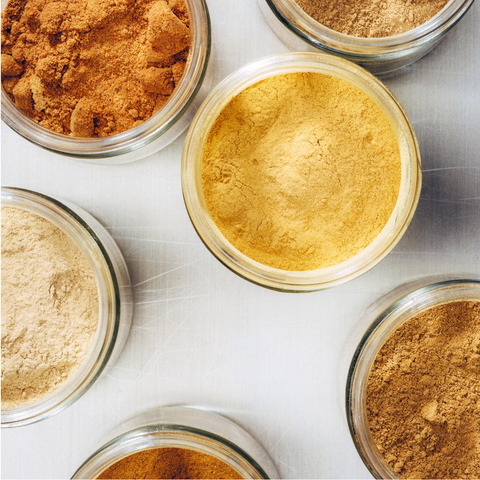Even the most even-keeled people deal with stress on a regular basis. It’s part of life. Your body’s stress response has evolutionary roots, after all. Your fight-or-flight response is designed to protect you from danger. Think of it like your body’s alarm system. Sometimes that alarm can be a little sensitive, erring a bit too much on the side of caution. When that happens, it can lead to chronic stress.
Giving your body the tools it needs to cope with stress is crucial. Healthy lifestyle habits like yoga, meditation, and exercise can help you maintain bodily balance, but addressing stress from the inside out is also essential. One way to do this is by using adaptogens.
What are adaptogens? Let’s take a deeper look at these potent herbs that can help curb the detrimental effects of stress.
What Are Adaptogens?
Adaptogens have a long history in the world of Traditional Chinese Medicine and Ayurveda, but the term was only coined in the 1940s by a Soviet toxicologist who was looking into the stamina and survival-boosting effects of medicinal plants.
Many adaptogenic herbs and medicinal mushrooms have been used for thousands of years.
So what makes them so unique?
Adaptogens work by reducing the effects of stress on the body and restoring balance to the nervous, immune, and endocrine systems.
Not all medicinal herbs and mushrooms are considered adaptogens, though. To be an adaptogen, an herb has to:
- Support the whole body’s ability to cope with stress
- Be capable of bringing balance back to the body
- Be nontoxic at a typical therapeutic dose
It’s important to note that even the most common adaptogens and medicinal mushrooms can have powerful effects. Consider consulting a healthcare professional before incorporating these potent substances into your routine.
How Do Adaptogens Work?
Adaptogenic herbs and mushrooms work by way of biologically active compounds. Because the process by which adaptogens work is complex, it’s not totally clear exactly how adaptogens produce the effects they do.
What experts do know is that these active compounds affect different parts of the body (tissues and organs) by way of the hypothalamic-pituitary-adrenal axis (HPA Axis) and the Sympathoadrenal System (SAS).
The HPA Axis connects your brain with various bodily systems, like your nervous, digestive, immune, and circulatory systems. It controls your body’s stress response using chemical and hormone-based communication.
The SAS comprises your sympathetic nervous system and adrenals and is responsible for your fight-or-flight response.
Because they work via these far-reaching bodily systems, they can produce a broad range of effects.
Health Benefits of Adaptogens
According to the American Psychological Association (APA), about 72% of U.S. adults felt stress-related health impacts in 2022 — from sleep troubles to constant feelings of worry, stress is a widespread issue. Adaptogens can help with stress, making it easier to cope and stave off the feeling of overwhelm.
Here are a few adaptogen benefits of note:
They Regulate Cortisol Levels
Your body releases cortisol (aka the stress hormone) as part of its fight-or-flight response. That’s fine from time to time, but when your stress levels remain consistently high, elevated cortisol levels can cause inflammation and stress on the immune system.
Adaptogens help keep cortisol levels balanced by improving adrenal gland secretion (the glands that excrete cortisol), thereby reducing the adverse effects of chronic stress like fatigue and brain fog.
They Improve Blood Flow
Proper circulation is vital for healthy day-to-day functioning. Good circulation ensures your muscles (and brain) have plenty of oxygen-rich blood to fuel your activities (and thinking).
Better blood flow can also help control inflammation in the body resulting from chronic stress, helping to bring you back to homeostasis.
They Help Keep Hormones Balanced
Fluctuations in hormones can seriously impact how you feel — physically and mentally. Adaptogens are all about balancing hormones naturally in the body, and evidence suggests that adaptogens can also help support hormonal regulation.
Types of Adaptogens
Some of the most common types of adaptogens include:
1. Ginseng
Research suggests that Asian Ginseng is capable of regulating cortisol levels, providing natural stress relief to the body, especially environmental stress.
There’s also evidence that American Ginseng may help improve working memory, reaction times, and immune system health.
2. Ashwagandha
Ashwagandha is an Ayurvedic plant well-known for its body-balancing abilities, specifically its ability to regulate cortisol and other stress hormones.
Ashwagandha powder is also thought to promote calm, which may help make it easier to cope with and recover from stress.
Research also points to Ashwagandha’s ability to improve sexual function and well-being in men and women. This may be due to the plant’s cortisol-regulating effects. Lower stress levels make it easier to feel rested and refreshed — and primed for a healthy, satisfying sex life.
3. Rhodiola
This adaptogenic medicinal mountain plant targets both physical and biological stress. In particular, research shows that it may help limit both physical and mental fatigue. When your mind and body are tired it can be tougher to tackle stress head-on.
4. Reishi
Adaptogenic mushroom power! This medicinal mushroom is thought to promote a positive stress adaptation and improve sleep quality. And you’re probably well aware that a good night’s sleep is crucial for managing stress regularly.
A 2005 randomized-controlled study involving 132 people with chronic fatigue found that participants who took Reishi mushroom powder every day for 8 weeks experienced less fatigue than those who took the placebo.
Our Reishi powder contains organic Reishi hand harvested from China. We use 100% fruiting body mushrooms; no added fillers, starch, grains or mycelium.
5. Tulsi
Tulsi (aka Holy Basil) is a nutrient-dense adaptogenic herb containing high amounts of essential vitamins and minerals like Vitamin A, Calcium, Zinc, and Vitamin C.
There’s evidence that it may help reverse metabolic stress by regulating blood sugar, lipid levels, and blood pressure. It curbs psychological stress by helping to improve memory and brain function.
6. Shilajit
This tar-like substance native to the Himalayas is another potent, nutrient-filled adaptogen. Its hormone-balancing properties have made it a popular traditional remedy for low libido.
Research also suggests that Shilajit may be able to boost testosterone levels in males.
7. Shatavari
Shatavari is another Ayurvedic adaptogen with a long history of use as a hormonal balancer, particularly in females, helping to relieve PMS, improve fertility, and support people through menopause. By restoring hormone balance, Shatavari is a great supplement to increase libido as well.
In addition to its research-backed hormone-balancing essence, the plant also has anti-inflammatory properties.
8. Schisandra
This red berry is a staple of Traditional Chinese Medicine and is known for its ability to support endocrine, immune, and nervous system health.
One scientific literature review points out that several clinical studies have found evidence that Schisandra can boost cognitive performance and alter cortisol levels in the blood and saliva.
Sign Up, Nerd Out
Get wellness tips, education, and recipes
delivered straight to your inbox.
Get wellness tips, education,
and recipes delivered
straight to your inbox.
Takeaway
Adaptogens can’t take away the stress in your life, but they can help support your natural stress response, enabling you to better cope in the face of everyday stressors.
Incorporating an adaptogen supplement into your routine can help restore your body’s balance and prevent the harmful effects of chronic stress.
By caring for your body with adaptogenic mushrooms and herbal natural supplements, you can create a more resilient you, promoting overall health and well-being regardless of what comes your way.
Sources
- Ashwagandha. (2023). https://www.nccih.nih.gov/health/ashwagandha
- Asian ginseng. (2020). https://www.nccih.nih.gov/health/asian-ginseng
- Chauhan S, et al. (2022). Effect of standardized root extract of ashwagandha (Withania somnifera) on well‐being and sexual performance in adult males: A randomized controlled trial. https://www.ncbi.nlm.nih.gov/pmc/articles/PMC9297375/
- Cohen MM. (2014). Tulsi - Ocimum sanctum: A herb for all seasons. https://www.ncbi.nlm.nih.gov/pmc/articles/PMC4296439/
- Dongre S, et al. (2015). Efficacy and safety of Ashwagandha (Withania somnifera) root extract in improving sexual function in women: A pilot study. https://www.ncbi.nlm.nih.gov/pmc/articles/PMC4609357/
- Ishaque S, et al. (2012). Rhodiola rosea for physical and mental fatigue: A systematic review. https://bmccomplementmedtherapies.biomedcentral.com/articles/10.1186/1472-6882-12-70
- Jamshidi N, Cohen MM. (2017). The clinical efficacy and safety of Tulsi in humans: A systematic review of the literature. https://doi.org/10.1155/2017/9217567
- Lee S, et al. (2017). Effects of ginseng on stress-related depression, anxiety, and the hypothalamic-pituitary-adrenal axis. https://www.ncbi.nlm.nih.gov/pmc/articles/PMC5628357/
- Li Y, Pham V, Bui M, et al. (2017). Rhodiola rosea L.: An herb with anti-stress, anti-aging, and immunostimulating properties for cancer chemoprevention. https://doi.org/10.1007/s40495-017-0106-1
- Liao LY, He YF, Li L, et al. (2018). A preliminary review of studies on adaptogens: Comparison of their bioactivity in TCM with that of ginseng-like herbs used worldwide. https://doi.org/10.1186/s13020-018-0214-9
- Mancuso C, Santangelo R. (2017). Panax ginseng and Panax quinquefolius: From pharmacology to toxicology. https://www.sciencedirect.com/science/article/pii/S0278691517303915
- Mikulska P, Malinowska M, Ignacyk M, et al. (2023). Ashwagandha (Withania somnifera)—current research on the health-promoting activities: A narrative review. https://doi.org/10.3390/pharmaceutics15041057
- Pandey AK, et al. (2018). Impact of stress on female reproductive health disorders: Possible beneficial effects of shatavari (Asparagus racemosus). https://www.sciencedirect.com/science/article/abs/pii/S0753332218301665?via%3Dihub
- Pandit S, et al. (2015). Clinical evaluation of purified Shilajit on testosterone levels in healthy volunteers. https://onlinelibrary.wiley.com/doi/full/10.1111/and.12482
- Panossian AG. (2017). Understanding adaptogenic activity: specificity of the pharmacological action of adaptogens and other phytochemicals. https://pubmed.ncbi.nlm.nih.gov/28640972/
- Panossian AG, et al. (2020). Evolution of the adaptogenic concept from traditional use to medical systems: pharmacology of stress- and aging-related diseases. https://onlinelibrary.wiley.com/doi/10.1002/med.21743
- Panossian AG, et al. (2008). Pharmacology of schisandra chinensis bail: An overview of Rhodiola. (2020). https://www.nccih.nih.gov/health/rhodiola
- Russian research and uses in medicine. https://www.sciencedirect.com/science/article/abs/pii/S037887410800216X?via%3Dihub
- Salve J, et al. (2019). Adaptogenic and anxiolytic effects of ashwagandha root extract in healthy adults: A double-blind, randomized, placebo-controlled clinical study. https://www.cureus.com/articles/25730-adaptogenic-and-anxiolytic-effects-of-ashwagandha-root-extract-in-healthy-adults-a-double-blind-randomized-placebo-controlled-clinical-study
- Scholey A, et al. (2010). Effects of American ginseng (Panax quinquefolius) on neurocognitive function: An acute randomised, double-blind, placebo-controlled, crossover study. https://www.ncbi.nlm.nih.gov/pmc/articles/PMC2952762/
- Speers AB, et al. (2021). Effects of Withania somnifera (Ashwagandha) on stress and the stress-related neuropsychiatric disorders anxiety, depression, and insomnia. https://www.ncbi.nlm.nih.gov/pmc/articles/PMC8762185/
- Stress. (2022). https://www.nccih.nih.gov/health/stress
- Stress in America 2022. (2022). https://www.apa.org/news/press/releases/stress/2022/concerned-future-inflation
- Tang W, et al. (2005). A randomized, double-blind and placebo-controlled study of Ganoderma lucidum polysaccharide extract in neurasthenia. https://pubmed.ncbi.nlm.nih.gov/15857210/
- Todorova V, et al. (2021). Plant adaptogens—History and future perspectives. https://www.ncbi.nlm.nih.gov/pmc/articles/PMC8398443/
- Xia N, et al. (2016). Schisandra chinensis and Rhodiola rosea exert an anti-stress effect on the HPA axis and reduce hypothalamic c-Fos expression in rats subjected to repeated stress https://www.ncbi.nlm.nih.gov/pmc/articles/PMC4727095/
- Zeng P, Guo Z, Zeng X, et al. Chemical, biochemical, preclinical and clinical studies of Ganoderma lucidum polysaccharide as an approved drug for treating myopathy and other diseases in China. https://doi.org/10.1111/jcmm.13613
- J Cell Mol Med. 2018;22(7):3278-3297. doi:10.1111/jcmm.13613 Understanding the Stress Response. Harvard Health Publishing. Published March 2011. https://www.health.harvard.edu/staying-healthy/understanding-the-stress-response

.png?v=1692949450396)
.png?v=1692949460682)













